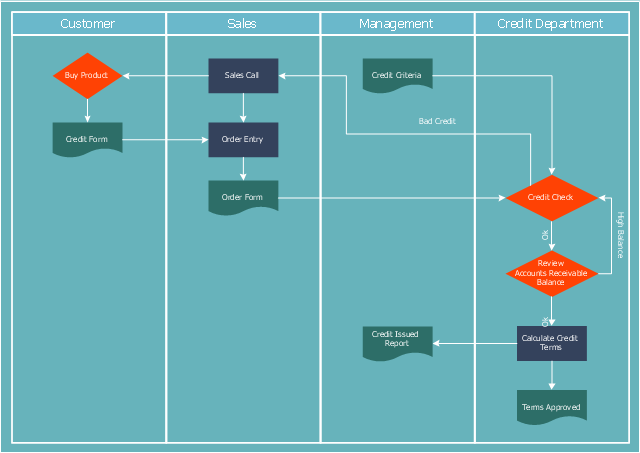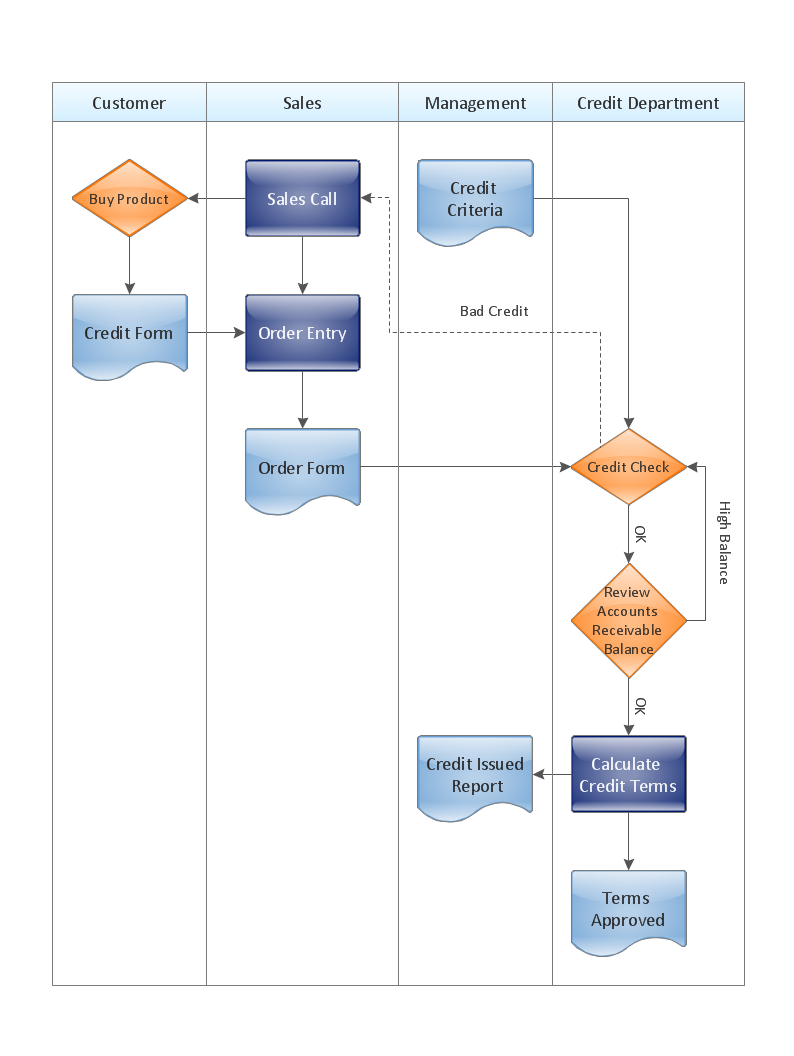"Credit (from Latin credo translation. "I believe" ) is the trust which allows one party to provide resources to another party where that second party does not reimburse the first party immediately (thereby generating a debt), but instead arranges either to repay or return those resources (or other materials of equal value) at a later date. The resources provided may be financial (e.g. granting a loan), or they may consist of goods or services (e.g. consumer credit). Credit encompasses any form of deferred payment. Credit is extended by a creditor, also known as a lender, to a debtor, also known as a borrower." [Credit (finance). Wikipedia]
The cross-functional (deployment) flowchart example "Credit approval process" was created using the ConceptDraw PRO diagramming and vector drawing software extended with the Cross-Functional Flowcharts solution from the Business Processes area of ConceptDraw Solution Park.
The cross-functional (deployment) flowchart example "Credit approval process" was created using the ConceptDraw PRO diagramming and vector drawing software extended with the Cross-Functional Flowcharts solution from the Business Processes area of ConceptDraw Solution Park.
 Cross-Functional Flowcharts
Cross-Functional Flowcharts
Cross-functional flowcharts are powerful and useful tool for visualizing and analyzing complex business processes which requires involvement of multiple people, teams or even departments. They let clearly represent a sequence of the process steps, the order of operations, relationships between processes and responsible functional units (such as departments or positions).
Cross-Functional Flowchart - The easiest way to draw crossfunctional
ConceptDraw PRO diagramming software provides vector shapes and connector tools for quick and easy drawing diagrams for business, technology, science and education. Use ConceptDraw PRO enhanced with solutions from ConceptDraw Solution Park to create diagrams to present and explain structures, process flows, logical relationships, networks, design schemes and other visually organized information and knowledge.- Approval Flow Chart
- Flowchart Template For Approval Process
- Credit approval process - Cross-functional flowchart | Cross ...
- Process Flowchart | Approval Process and Segregation of ...
- Approval Flow Chart Template
- Sample Process Flowchart On Payment Processing
- Voucher payable flowchart | Approval Process and Segregation of ...
- Project Approval And Creation Process Flowchart
- Invoice payment process - Flowchart | Global Payment Solutions ...
- Credit approval process - Cross-functional flowchart | Credit ...
- Approval Process and Segregation of Responsibilities Accounting ...
- Credit approval process - Cross-functional flowchart | Approval ...
- Cross-Functional Flowcharts | Approval Process and Segregation of ...
- Flowchart Sample Approval
- Flowcharts | Process Flow Maps | Process Flow Chart Software Free ...
- Credit approval process - Cross-functional flowchart | Flowchart ...
- Credit approval process - Cross-functional flowchart | Example ...
- Approval Process and Segregation of Responsibilities Accounting ...
- Credit Card Order Process Flowchart . Flowchart Examples | Credit ...
- Sample Approval Flowchart


